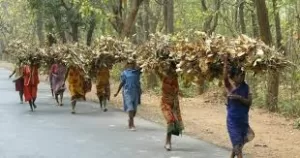‘Manipur Violence State-Sponsored’: It’s Not Communal, has Hidden Corporate Agenda
[Calling Manipur violence “state-sponsored”, a three-member fact finding team of the National Federation of Indian Women (NFIW) has said that what is occurring currently in State is “not communal violence, nor is it merely a fight between two communities. It involves the questions of land, resources, and the presence of fanatics and militants.”
Claiming that “the fascist government shrewdly carried out strategies to materialize its hidden pro-corporate agenda, which has led to the current crisis”, the team – consisting of NFIW general secretary Annie Raja, national secretary Nisha Siddhu, and independent lawyer Deeksha Dwivedi – the fact finding team in its report said, this was evident from the events which unfolded ahead of the violence.
These were, it said, “Demolition of three churches by the government in New Chekon on the pretext of being built on encroached land; eviction of Kuki villagers from Kangpopki and Tengoupal areas and the demolition of their houses in the name of Forest Preservation and Wildlife Protection; and the order of the Manipur High Court regarding ST status to the Meiteis.]
❈ ❈
Text of Statement:
A three-member fact finding team comprising NFIW (National Federation of Indian Women) General Secretary Annie Raja, National Secretary, Nisha Siddhu, and Deeksha Dwivedi, independent Delhi based lawyer visited Manipur from 28th June to 1st July, 2023. The gross breakdown of constitutional bodies, apparent suspension of the right to life, and the absolute State apathy towards the crisis in Manipur prompted NFIW to take the initiative for democratic intervention in the situation.
Prior to the visit, NFIW had a series of meetings in Delhi with women from Kuki and Meitei communities, who had to flee Manipur owing to the violence. These meetings with the uprooted women gave a sense of urgency to the NFIW and accelerated our resolve to initiate democratic intervention in the ongoing situation in order to begin to bring back peace and stability in the state, especially for women and children. It was through these extensive consultations and outreach, that our 3-member team could visit Manipur. The team met people from different communities.
On 28th June, the team visited three relief camps in Imphal East and one government hospital (Regional Institute of Medical Sciences).
On 29th June, the team visited two relief camps in Moirang of Bishnupur district and the District Collector’s office. Later in the evening, the team also visited IMA Market and spoke with Meira Paibis.
On 30th June, the team visited Churachandpur district and met many victims of the violence in Relief camps including two young girls who were brutally assaulted by a mob of Meithei youth.
The team also met the District Collector of Churachandpur district and Assistant Collector of Bishnupur district and gave them suggestions about improving the condition of relief camps.
On the last day of the visit i.e. 1st July, the team visited Manipur Baptist Convention Centre Church and Catholic Bishop House in Imphal West District.
General observations
The first and foremost thing that engulfed our team as we began our journey was the sheer devastation of all sense of peace and life itself. Life as was known and held dear by the people of Manipur, navigating through the socio-economic precarity of everyday life, remains unavailable to them currently.
What is occurring currently in Manipur is not communal violence nor is it merely a fight between two communities. It involves the questions of land, resources, and the presence of fanatics and militants. The fascist government shrewdly carried out strategies to materialize its hidden pro-corporate agenda, which has led to the current crisis.
- It is a State-sponsored violence.
- The violence that broke out on the 3rd of May did not occur by itself, without any buildup. There was a clear backdrop of mistrust and anxiety that was being stoked amidst both the communities by the ruling dispensation at the State and Center in order to precipitate a full-blown civil war-like situation. Many incidents took place in the months of March and April 2023 which clearly indicated the possibility of violent clashes. But the government chose to ignore it and allowed the brutal violence to happen.
- The socio-political history of Manipur is such wherein the society was hierarchically organized with the Meiteis being the dominant community and the Kukis being looked down upon as ‘uncivilized’. The constitutionally guaranteed affirmative action policies resulted in the Kukis in achieving some degree of social mobility in terms of gaining education and entering government jobs. This mobility of the Kukis has generated general anger and dissatisfaction amongst the majority Meitei community.
- Instead of taking steps to safeguard the lives and livelihood of the people of Manipur, the government continues its provocative actions which further deepens the anger and rift between two major communities.
- Some of the key moments were: 1: Demolition of three churches by the government in New Chekon on the pretext of being built on encroached land; 2: Eviction of Kuki villagers from Kangpopki and Tengoupal areas and the demolition of their houses in the name of Forest Preservation and Wildlife Protection; 3: the order of the Manipur High Court regarding ST status to the Meiteis; and 4: Attempt of the state government to put an end to Suspension of Operation.
- The All Tribal Student’s Union Manipur took out a Peace Rally on 3rd May against these incidents in Churachandpur district at around 12pm and the violence started around 3pm.
- It has been alleged by the Kukis that Meiteis were angry with the peace march, therefore, they tried burning the sacred Indo-Kuki War Memorial. Meiteis had come in large numbers to Churachandpur. They had also marked the houses of Meiteis and Kukis in advance.
- Both communities allege each other of attempting to raze down the sacred Indo Kuki War Memorial.
- Militants, fanatics and miscreants took advantage of the troubled situation.
- On 3rd and 4th May the majority of the houses were burned. It was shared that the security forces including the state police were lax and lethargic in controlling the violence. The Chief Minister was busy hosting the Vice President and uploading pictures on Twitter till 7 pm, while the state was burning.
- The general sense which prevails in both communities is unhappiness and anger with the Chief Minister over his mishandling of the situation.
Relief camps
- The Relief camps are mostly being run with the efforts of well-meaning citizens and civil society organizations with very limited support from the government. The condition of the relief camps is reflective of the state government’s disinterest regarding the well being of the displaced and victimized citizenry. This clearly is disrespect to the dignity of the victims of violence.
- Most of the people in the camps are daily wage workers and ordinary people.
- Children and young people are worried about the uncertain future as they are unable to continue their studies or pursue any employment opportunities.
- The populace of the relief camp who suffered violence are not aware of any registering of FIRs or any compensation being offered by the State Government. It also came to light that no Compensation Claims Commission was set up by the state government.
- The camps have persons aged 1 month to those who are 80 and above. Many pregnant women are also there in the camps. Persons with various health conditions are struggling without proper medical attention.
- Food provided by the government is insufficient, especially for infants, elderly, pregnant, and lactating women. There is also a massive shortage of clean water, sanitation, and sanitary pads.
Conclusion
The State government and its machinery remain defunct in the ongoing crisis. The criminal apathy of the Union government exacerbates the prevailing grim situation. Their current inaction and the preceding selective actions are what is sustaining the unabated violence of whose worst victims are the women and children of Manipur. The grotesque present of Manipur is one that has been curated by the State and its private agenda. The citizens of Manipur desire peace and normalcy to be restored. They remain wary of the dubious role played by the governments and the various security forces. Safety and security have become the responsibility of the people. They also remain keenly vigilant against violent fringe groups. While there remains a massive trust deficit between the communities, there also stands an overwhelming desire to reclaim and restore dignified life for all.
Charter of demands
- Disarming all groups and individuals
- All efforts to restore peace and harmony must be strongly initiated.
- Initiate confidence-building measures involving all stakeholders, particularly women organizations.
- Immediate resignation of Chief Minister Biren Singh.
- High-powered/ Supreme Court monitored inquiry and justice process.
- Registration of FIRs.
- Constitute Compensation Claims Commission immediately and give compensation to the victims.
- Urgent improvement of the conditions in the relief camps.
- Time-bound relief and meaningful rehabilitation with livelihood opportunities.
- Urgent steps to ensure the continuity of education of students.
- Set-up buffer zone with same security force on both sides.
(Statement courtesy: Counterview, a newsblog that publishes news and views based on information obtained from alternative sources, which may or may not be available in public domain, allowing readers to make independent conclusions.)




